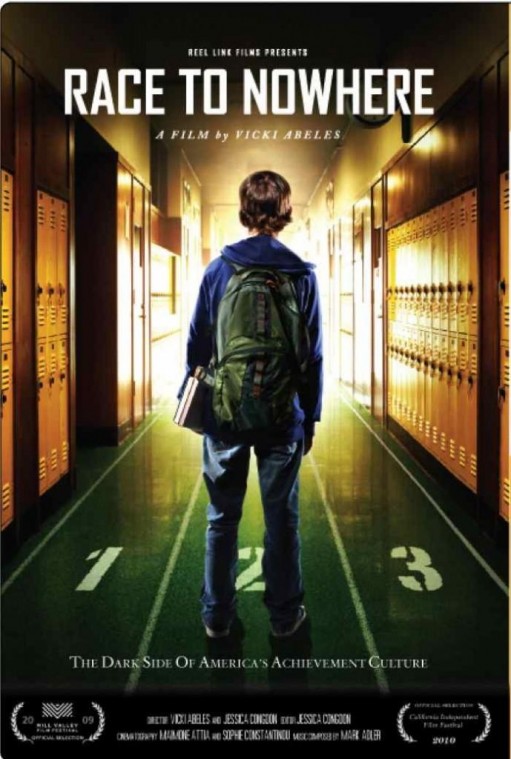Iona screens film about school pressure
January 25, 2011
Take as many AP classes as you can. Get involved in the school’s clubs, organizations, and sports teams. Do community service. Try to find a part time job. Be a well-rounded student.
It seems that high school guidance counselors repeat this mantra to students beginning the first day of freshman year and spanning through the middle of senior year.
With the increasing number of students applying to colleges, students are feeling the pressure of the competitive battle to gain admittance into the best colleges in the country.
Taking challenging AP classes should be a place in which full understanding and appreciation for the material at hand is secondary to learning enough to earn at least a three on the crucial exam.
A student’s life becomes a balancing act between earning top marks in school, performing well in sports and/or music, volunteering to help the less fortunate, and being involved in various clubs and organizations. Success in school no longer becomes a desire, but a requirement. After all their hard work in high school, students must begin the cycle over again—in college.
On Jan. 25, Iona screened the film “Race to Nowhere,” directed by Vicki Abeles. Abeles gives the audience a glimpse into the pressure and stress thrust upon today’s students.
The film’s Web site, www.racetonowhere.com explains that the film “points to the silent epidemic in our schools: cheating has become commonplace, students have become disengaged, stress-related illness, depression and burnout are rampant, and young people arrive at college and the workplace unprepared and uninspired.”
Abeles explains how she was inspired to film the documentary after her own daughter was rushed to the hospital at age 12. Her daughter was found doubled over in pain from stress related to “battling homework assignments, studying for tests, and panic attacks in the middle of the night.”
It was after this incident that Abeles began speaking to education experts and learning about the commonality of stress and pressure amongst today’s youth. “I wanted to do something to raise awareness on a large scale, and to bring communities together to galvanize change,” Abeles said. “I was determined to give voice to those on the front lines of education – students and teachers.”
Iona’s screening of the film was spearheaded by Chair of the Education Department Catherine O’Callaghan. “I was inspired to bring the film to Iona due to the debate regarding education, its purpose, and funding. The students in the film are quite similar to those in our partnership districts such as New Rochelle, Bronxville, Scarsdale, etc.,” O’Callaghan said.
Abeles has said that she decided to make the documentary in order to spark questioning of and change in the state of education in the United States.
“The most important question is ‘What should be the purpose of education for the twenty-first century’. Currently schools across the nation are predominantly focusing on raising test scores, yet that doesn’t necessarily mean that this generation will have the necessary skills for the workplace of tomorrow,” O’Callaghan said.
In many cases, standardized testing has placed both teachers and students at a strong disadvantage as teachers are forced to “teach to the test.” In the case of the AP exams, teachers teach at an accelerated pace and must conform to a rigid syllabus set forth by what is asked on the exams. Students learn just as much as is needed to pass the test.
If, for example, an AP Calculus student does not fully grasp the theory behind a derivative, but can simply follow the steps and go through the motions to arrive at the answer, then that’s all he needs. The student is able to arrive at the correct answer, but he may have little to no understanding of why the answer is correct. Yet, in the case of standardized tests, a correct answer is all that matters.
The stress on success through standardized tests distorts students’ perception of education as they become disengaged and apathetic without learning the skills they need for the future. “Race to Nowhere” is meant to spark debate regarding the flaws in the education system and to question its place in the twenty-first century culture of America.
“I am hoping that the film will provide a forum to discuss the central issues which every society must address. What skills, knowledge, dispositions are needed for a twenty-first century democracy? Also, currently we must examine the ways technology is transforming our lives and, therefore, should radically alter how we instruct students,” O’Callaghan said.
Education and the desire to learn is a pivotal step on the ladder to success. Thus, the stress, pressure, and disengagement brought upon students under the current high-stakes culture invading the country’s schools, poses a potential crisis for the United States.
Students, educators, and parents must ask themselves, what are the cracks in the foundation of the educational system and what actions are we, as a nation, willing to take to fix them.






